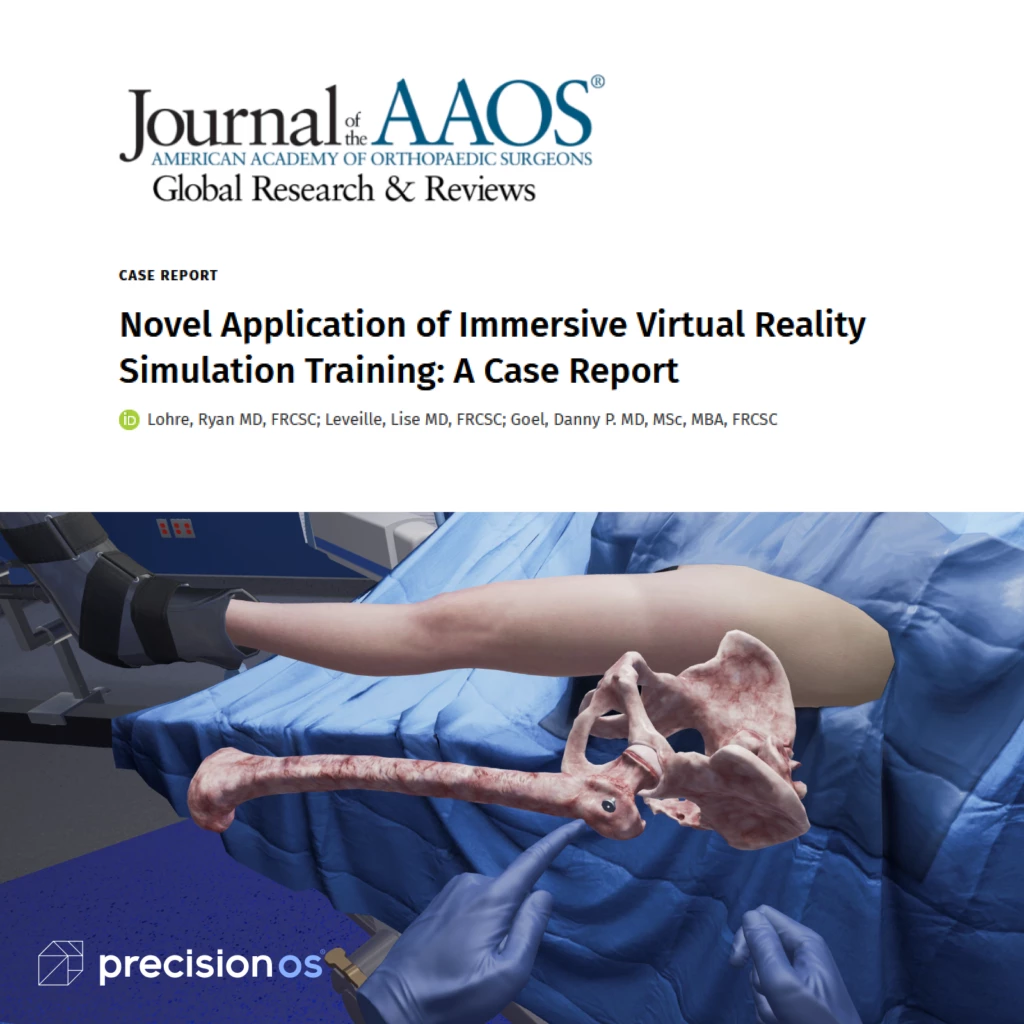VANCOUVER, C.-B., le 7 décembre 2021. Les chercheurs ont maintenant le premier rapport de cas sur la façon dont les compétences acquises via PrecisionOS La formation en réalité virtuelle immersive (iVR) peut directement améliorer et impacter les performances du chirurgien dans un cas opératoire réel.
The documented report, which involved PrecisionOS® orthopedic surgeon training used at the University of British Columbia Medical Center (UBC), was published in JAAOS Global Research & Reviews, November 2021-Volume 5, issue 11. “Novel Application of Immersive Virtual Reality Simulation Training: A Case Report.”
Plan de l'étude : un patient de 15 ans s'est présenté avec des douleurs chroniques à l'aine et aux jambes. Le chirurgien traitant a diagnostiqué chez le jeune homme une épiphyse fémorale glissante (ECFC) et a entrepris une procédure d'épinglage percutané (mise en place d'un implant dans la hanche), arrêtant la chirurgie en raison de difficultés de visualisation de la structure osseuse de la jambe et d'interprétation. Le chirurgien a ensuite ramené le patient en salle d'opération (RO) pour une deuxième tentative qui a également échoué. Ces deux tentatives chirurgicales infructueuses ont impliqué des doses importantes d'anesthésique et de rayonnement.
The patient was then transferred to the children’s hospital in the same medical center where the fifth-year orthopedic resident on duty practiced with a SCFE training module four consecutive times using the PrecisionOS iVR system The resident, who had not observed nor performed this procedure in more than two years improved his 3D spatial awareness by using the capability of the VR software to pull the deformed bone out of the body, and, after using many unique approaches and implant sizes offered by the PrecisionOS training module, determine the right implant for the procedure.
After completing the training, where his practices showed he had improved his performance evaluation from 70% to 93% (maximum score 100%). on PrecisionOS’ proprietary Precision Score tm analyse, le résident s'est ensuite rendu dans une salle d'opération en direct (sous la supervision uniquement d'un chirurgien orthopédiste spécialisé en pédiatrie) et a positionné l'os au bon endroit. Au cours de sa pratique chirurgicale, il a également appris qu'il serait capable d'utiliser beaucoup moins de radiations .
PrecisonOS’ proprietary analysis score takes into consideration several variables related to performance including errors made, implant chosen, complications and technical skill. From the first to last practice case, the resident’s time was lowered from 8 minutes 44 seconds in the first session to 3 minutes 46 seconds, equating to a 232% reduction in training time.
Unlike any other system, this resident had the opportunity to engage in true simulation using the PrecisionOS system. It’s very encouraging to see how this technology, and their validated research findings can now have a direct impact on patient care,”. Dr. Kishore Mulpuri, Orthopedic Surgery Chair, UBC, said. This software has significant patient safety implications which is always our top priority as clinicians and educators”
La formation avec PrecisonOS signifiait également que le patient était finalement exposé à 1/10ème de la dose de rayonnement des chirurgies infructueuses initiales, et beaucoup moins de temps anesthésique, établissant les implications importantes de ce système pour la sécurité des patients.
“Being able to really feel like I actually performed the procedure four times before taking the patient to the OR was like night and day,” Ryan Lohre, M.D., the surgical resident who performed this procedure, stated. “It is not a stretch to say that PrecisionOS’ virtual reality training truly has the potential to save millions of patients from unnecessary pain, radiation, anesthetic time and hospitals from significant costs.”
The Case Report suggests that the use of the unique and validated approach to simulation implemented by PrecisionOS offers an unparalleled opportunity for surgeons’ to improve their performance, decision making, cognitive understanding and psycho motor skills before performing treatments on patients
À propos de PrecisionOS
PrecisionOS was founded in partnership with clinical orthopedic surgeon educators and an expert group of XR (virtual reality, augmented reality and mixed reality) developers to create training for orthopedic surgeons. The company’s immersive simulations are scientifically validated, peer-reviewed and published in leading medical research journals. Participants engage in a realistic operating environment, alone or in collaboration with other trainees anywhere in the world, test their knowledge and desire to try alternate approaches, receive instructive feedback and repeat procedures until achieving proficiency.
PrecisionOS est basé à Vancouver, en Colombie-Britannique, avec des affiliations collaboratives avec plus de 40 grandes institutions médicales aux États-Unis et au Canada. Leur logiciel a été utilisé dans plus de 35 pays et 500 villes à travers le monde.
Contact médias :
Elaine Murphy; 818.613.1951; emurphypr@outlook.com


